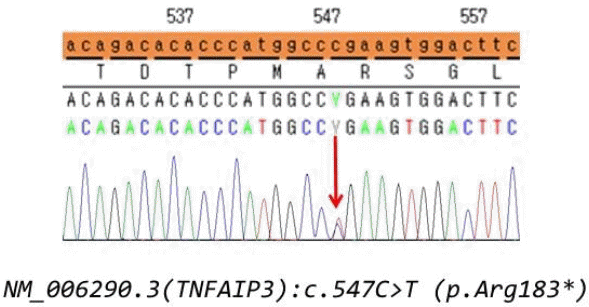All issues > Volume 66(2); 2023
Haploinsufficiency A20 misdiagnosed as PFAPA (periodic fever, aphthous stomatitis, pharyngitis, and cervical adenitis) syndrome with Kikuchi disease
- Corresponding author: Seong Heon Kim, MD, Department of Pediatrics, Seoul National University Children’s Hospital, 101 Daehak-ro, Jongno-gu, Seoul 03080, Korea Email: kimsh22@snu.ac.kr, https://orcid.org/0000-0001-8003-3010
- Received March 21, 2022 Revised June 3, 2022 Accepted June 6, 2022
- What is different with PFAPA syndrome and HA20?
- What is different with PFAPA syndrome and HA20?
The diagnosis of PFAPA syndrome is established on the basis of clinical criteria [1]. To make a diagnosis of PFAPA syndrome, it is necessary to rule out the presence of another group of diseases that are caused by mutations of genes involved in the regulation of the inflammatory response [2]. Criteria for PFAPA syndrome can distinguish between PFAPA and hereditary recurrent fever syndromes with high sensitivity and specificity [3]. PFAPA is diagnosed when 7 of the following 8 features are satisfied: presence of pharyngotonsillitis, duration of fever between 3–6 days, cervical lymphadenitis, or periodicity; and absence of diarrhea, chest pain, skin rash, or arthritis. Our patient had recurrent fevers and oral, anal, and genital ulcers. In addition, she experienced diarrhea during fever and skin rash after its resolution. These features were atypical for PFAPA syndrome; therefore, we performed NGS to identify inflammatory diseases that cause periodic fever.According to a review article that included 89 patients with HA20, the most common symptom was oral ulcers (70%), followed by recurrent fever (42%), gastrointestinal ulcers (40%), skin lesions (38%), genital ulcers (36%), musculoskeletal disorders (34%), and autoimmune thyroid disorders (19%) [4]. Abdominal symptoms such as abdominal pain, digestive ulcers, vomiting, diarrhea, and constipation are also common in HA 20 patients [5,6]. The symptoms of our patient were oral, genital, and anal ulcers, recurrent fever, diarrhea, and skin lesions. The c.547C>T variation of the proband was present in our patient, and the TNFAIP3 (c.547C>T, p.Arg183*) gene mutation is already known to cause HA20 [4,6,7].
- How to treat HA20?
- How to treat HA20?
According to a review article that included 26 studies on HA20, nearly half of the patients responded well to colchicine, especially when used in combination with immunosuppressive or biological agents [5]. In case of worsening of our patient’s symptoms, the next step will be to treat her with biological agents such as TNF-α blockers.
- In what cases should genetic testing be considered in patients with periodic fever?
- In what cases should genetic testing be considered in patients with periodic fever?
In the present case, Kikuchi disease occurring with PFAPA syndrome was considered initially, but the patient did not have typical symptoms of PFAPA syndrome. Therefore, we conducted NGS for genes related to monogenic autoinflammatory diseases that could cause periodic fever and diagnosed HA20. Until now, only 2 patients, including our case, have been diagnosed with HA20 in Korea [8]. Performing NGS in patients with periodic fever and atypical features of PFAPA syndrome could increase the number of patients diagnosed with HA20. In conclusion, NGS can be used when patients with recurrent fever have atypical symptoms of PFAPA syndrome. In the case of HA20, it can be suspected when there is diarrhea or mucosal ulcerations in patients with recurrent fever, especially when the onset is at a very young age.Answer: 3
- Footnotes
-
Conflicts of interest No potential conflict of interest relevant to this article was reported.
Ethics approval This study was approved by the Institutional Review Board (IRB) in Pusan National University Yangsan Hospital (IRB No. 05-2021-274). The authors obtained informed consent from the parents for publish this study.
Funding This study was supported by a 2022 research grant from Pusan National University Yangsan Hospital.
-
Fig. 1.

Table 1.
WBC, white blood cells; Hb, hemoglobin; AST, aspartate transaminase; ALT, alanine transaminase; ALP, alkaline phosphatase; LDH, lactate dehydrogenase; BUN, blood urea nitrogen; Cr, creatinine; Ca, calcium; P, phosphorus; CRP, C-reactive protein; ESR, erythrocyte sedimentation rate; ANCA, anti-neutrophil cytoplasmic antibody; dsDNA, double-stranded DNA; IgG, immunoglobulin G; RNP, ribonucleoprotein; Ab, antibody; ANA, antinuclear antibody; C3, complement 3; C4 complement 4.
- References
- 1. Thomas KT, Feder HM Jr, Lawton AR, Edwards KM. Periodic fever syndrome in children. J Pediatr 1999;135:15–21.
[Article] [PubMed]2. Kastner DL. Hereditary periodic fever syndromes. Hematology Am Soc Hematol Educ Program 2005:74–81.
[Article]3. Gattorno M, Hofer M, Federici S, Vanoni F, Bovis F, Aksentijevich I, et al. Classification criteria for autoinflammatory recurrent fevers. Ann Rheum Dis 2019;78:1025–32.
[Article] [PubMed]4. Chen Y, Ye Z, Chen L, Qin T, Seidler U, Tian D, et al. Association of clinical phenotypes in haploinsufficiency A20 (HA20) with disrupted domains of A20. Front Immunol 2020;11:574992.
[Article] [PubMed] [PMC]5. Yu MP, Xu XS, Zhou Q, Deuitch N, Lu MP. Haploinsufficiency of A20 (HA20): updates on the genetics, phenotype, pathogenesis and treatment. World J Pediatr 2020;16:575–84.
[Article] [PubMed]6. Berteau F, Rouviere B, Delluc A, Nau A, Le Berre R, Sarrabay G, et al. Autosomic dominant familial Behçet disease and haploinsufficiency A20: a review of the literature. Autoimmun Rev 2018;17:809–15.
[Article] [PubMed]

 About
About Browse articles
Browse articles For contributors
For contributors

